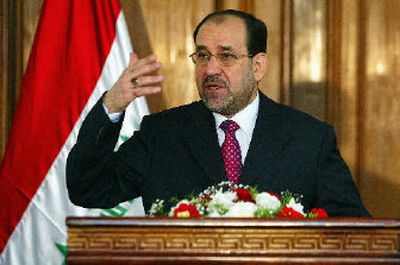Al-Maliki distancing himself from U.S. strategy, goals in Iraq

BAGHDAD, Iraq – U.S. officials and Iraqi Prime Minister Nouri al-Maliki are increasingly at odds over strategy and goals, a division that American officials in Iraq say is making it harder to pursue their objectives in Iraq.
On Wednesday, al-Maliki denounced an American bombing mission in the Baghdad neighborhood of Sadr City that the U.S. said had killed a notorious Shiite Muslim death-squad member. He also rejected a call Tuesday by the two top American officials in Iraq for a timetable for his government to tackle the nation’s most intractable problems.
“This government is one of popular will and national unity, and it is nobody’s right to put timetables before it,” al-Maliki said.
It was at least the third time in recent weeks that al-Maliki had publicly contradicted American positions, and it underscored that he draws much of his support from the very militia groups that the U.S. is pressing him to dismantle.
The differences with the Bush administration were also evident during President Bush’s news conference in Washington on Wednesday.
“I know many Americans are not satisfied with the situation in Iraq,” Bush said in an opening statement. “I’m not satisfied, either.”
He said the U.S. was pressing al-Maliki to move more quickly and warned that “America’s patience is not unlimited.”
But Bush also said the administration wouldn’t press too hard. “Look, we’ll push him,” he said, “but we’re not going to push him to the point where he can’t achieve the objective.”
With less than two weeks before congressional elections, a clamor has been growing among Democrats and some Republicans for a timetable that would require the Iraqi government to resolve certain issues or face a possible withdrawal of U.S. troops.
Polls indicate that Republicans could lose control of the House of Representatives and possibly the Senate, largely over dissatisfaction with developments in Iraq.
Bush acknowledged that the war has become a top-tier issue with voters, and noted that 93 American soldiers have been killed so far this month, a rare mention by the president of the war’s death toll.
But he said it was al-Maliki’s responsibility to find a solution to the violence and that the United States wouldn’t be drawn into supporting one side over the other in a civil war.
“Americans have no intention of taking sides in a sectarian struggle or standing in the crossfire between rival factions,” he said. “Our mission is to help the elected government in Iraq defeat common enemies, bring peace and stability to Iraq and to make our nation more secure.”
Identifying the common enemies has proved to be one of the most difficult tasks for American officials, however.
U.S. military officers and civilian officials have warned for months that Shiite militias are responsible for most of the civilian deaths in Iraq, and U.S. Ambassador Zalmay Khalilzad in May called them the biggest threat to Iraq’s security.
But the militias, notably the Mahdi Army, led by fiery cleric Muqtada al-Sadr, are also key to al-Maliki’s support, and the prime minister has objected on several occasions to U.S. efforts to rein them in.
On Wednesday, al-Maliki said American officials didn’t get his approval before they conducted the bombing raid in Sadr City, where his core supporters and many members of Sadr’s Mahdi Army live.
“In fact, we will ask for a clarification of what happened, and this is an issue we will review with the multinational forces so it won’t happen again,” al-Maliki said.
U.S. military officials here disputed al-Maliki’s claim, saying they never enter Sadr City without coordinating with his government.
According to a U.S. statement, Iraqi soldiers were conducting the raid in Sadr City when they came under fire and requested support from American aircraft. The aircraft “used precision gunfire only to eliminate the enemy threat,” the statement said.
Still, U.S. officials said they weren’t surprised by al-Maliki’s comments.
“We were expecting it,” said one top American military aide who asked to go nameless because of the sensitivity of the subject.
Last week, al-Maliki ordered the United States to release a Mahdi Army member it had seized in a raid for death squad involvement. In August, al-Maliki publicly berated the Americans for a raid on Sadr City.
The tension between al-Maliki and U.S. officials also was evident Tuesday during a news conference in Baghdad by Ambassador Khalilzad and Gen. William Casey, the top American military commander in Iraq.
Khalilzad and Casey said they’d won approval from the Iraqi government for a timetable to consider some of Iraq’s pressing issues, including disarming the militias, revamping the constitution and setting a date for parliamentary elections.
In elaborating on that agreement, Khalilzad said the commitment came from President Jalal Talabani. He didn’t mention al-Maliki except to say that he took the prime minister at his word when he promised to negotiate with al-Sadr.
Talabani, an ethnic Kurd, is a strong U.S. ally, but it’s unclear whether he has the authority to agree to a timetable on behalf of the government. Iraq’s constitution is vague about the responsibilities of the president and prime minister, although it appears that the prime minister – not the president – must approve agreements with other nations.
For many Iraqis, there’s no surprise that American officials and al-Maliki don’t see eye to eye. Before his appointment as prime minister, al-Maliki had a reputation as a staunch advocate for his fellow Shiites.
In the weeks-long battle earlier this year over who’d be prime minister, al-Maliki drew key backing from al-Sadr supporters, who hold more seats than any other group in parliament.
He’s since appointed al-Sadr supporters to government ministries such as health and education.